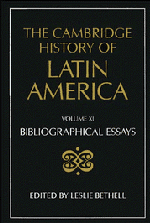Book contents
- Frontmatter
- I THE INDIGENOUS PEOPLES OF MIDDLE AND SOUTH AMERICA ON THE EVE OF THE CONQUEST
- II COLONIAL SPANISH AMERICA
- III COLONIAL BRAZIL
- IV THE INDEPENDENCE OF LATIN AMERICA
- 1 The origins of Spanish American independence
- 2 The independence of Mexico and Central America
- 3 The independence of Spanish South America
- 4 The independence of Haiti and the Dominican Republic
- 5 The independence of Brazil
- 6 International politics and Latin American independence
- V LATIN AMERICA: ECONOMY, SOCIETY, POLITICS, c. 1820 TO c. 1870
- VI LATIN AMERICA: ECONOMY, SOCIETY, POLITICS, c. 1870 to 1930
- VII LATIN AMERICA: ECONOMY, SOCIETY, POLITICS, 1930 to c. 1990
- VIII IDEAS IN LATIN AMERICA SINCE INDEPENDENCE
- IX LATIN AMERICAN CULTURE SINCE INDEPENDENCE
- X THE INTERNATIONAL RELATIONS OF LATIN AMERICA SINCE INDEPENDENCE
- THE CAMBRIDGE HISTORY OF LATIN AMERICA
1 - The origins of Spanish American independence
from IV - THE INDEPENDENCE OF LATIN AMERICA
Published online by Cambridge University Press: 28 March 2008
- Frontmatter
- I THE INDIGENOUS PEOPLES OF MIDDLE AND SOUTH AMERICA ON THE EVE OF THE CONQUEST
- II COLONIAL SPANISH AMERICA
- III COLONIAL BRAZIL
- IV THE INDEPENDENCE OF LATIN AMERICA
- 1 The origins of Spanish American independence
- 2 The independence of Mexico and Central America
- 3 The independence of Spanish South America
- 4 The independence of Haiti and the Dominican Republic
- 5 The independence of Brazil
- 6 International politics and Latin American independence
- V LATIN AMERICA: ECONOMY, SOCIETY, POLITICS, c. 1820 TO c. 1870
- VI LATIN AMERICA: ECONOMY, SOCIETY, POLITICS, c. 1870 to 1930
- VII LATIN AMERICA: ECONOMY, SOCIETY, POLITICS, 1930 to c. 1990
- VIII IDEAS IN LATIN AMERICA SINCE INDEPENDENCE
- IX LATIN AMERICAN CULTURE SINCE INDEPENDENCE
- X THE INTERNATIONAL RELATIONS OF LATIN AMERICA SINCE INDEPENDENCE
- THE CAMBRIDGE HISTORY OF LATIN AMERICA
Summary
Most of the documentary compilations and narrative sources throw more light on the course of independence than on its origins, but some data on the latter will be found in Biblioteca de Mayo, 17 vols. (Buenos Aires, 1960–3); Archivo del General Miranda, 24 vols. (Caracas, 1929–50); Biblioteca de la Academia Nacional de la Historia, 82 vols. (Caracas, 1960–6); Colección documental de la independencia del Perú, 30 vols. (Lima, 1971). Mexico and northern South America attracted the attention of a distinguished contemporary observer, Alexander von Humboldt, whose Ensayo político sobre el reino de la Nueva Espana, ed. Juan A. Ortega y Medina (Mexico, D.F., 1966), and Viaje a las regiones equinocciales del Nuevo Continente, 5 vols. (Caracas, 1956) illuminate conditions in the late colonial period. For an example of liberal economic writings in Buenos Aires, see Manuel Belgrano, Escritos económicos, ed. Gregorio Weinberg (Buenos Aires, 1954). The Spanish background has a large bibliography, of which the following is a small selection: Gonzalo Anes, El antiguo régimen: Los Borbones, 5th ed. (Madrid, 1981); Antonio Domínguez Ortiz, Sociedad y estado en el siglo XVIII espanol (Madrid, 1981); John Lynch, Bourbon Spain 1700–1808 (Oxford, 1989). The Enlightenment can be studied in Richard Herr, The Eighteenth-century Revolution in Spain (Princeton, N.J., 1958), and its impact in America in R. J. Shafer, The Economic Societies in the Spanish World (1763–1821) (Syracuse, N.Y., 1958); see also M. L. Pérez Marchand, Dos etapas ideológicas del siglo XVIII en México a través de los papeles de la Inquisición (Mexico, D.F., 1945).
- Type
- Chapter
- Information
- The Cambridge History of Latin America , pp. 219 - 224Publisher: Cambridge University PressPrint publication year: 1995



